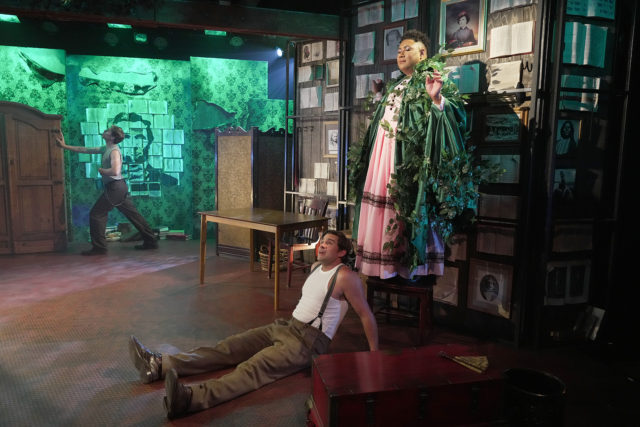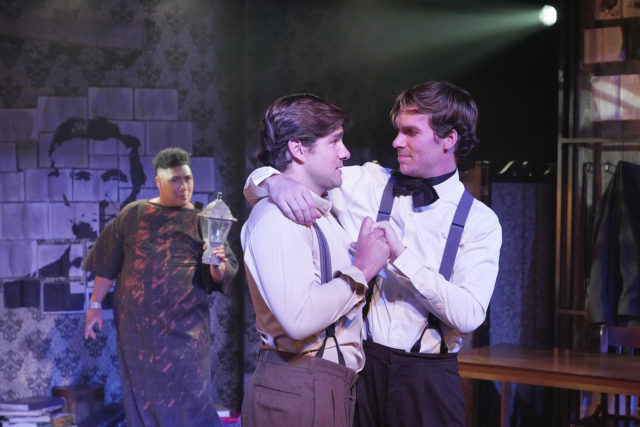
Pete Ploszek, Alex Esola, and Roger Q. Mason star in Lavender Men (photo by Jenny Graham)
LAVENDER MEN
Streaming from Skylight Theatre in Los Angeles
August 27, 28, 29, September 3, 4, $25-$38
skylighttheatre.org
The Civil War might be known as the battle between the Blue and the Gray, but Black Filipinx playwright and actor Roger Q. Mason turns to a different color in the world premiere of Lavender Men, continuing at the Skylight Theatre in Los Angeles and streaming online through September 4, in conjunction with Playwrights’ Arena.
During the pandemic, I watched virtual presentations of Mason’s The Duat, about a Black man (Gregg Daniel) searching for his place in a world of racial injustice, and Age Sex Location, part of the omnibus Matriarch: She’s Wide Awake Shining Light . . . , in which Ramy El-Etreby dances onstage in glittery drag and proclaims, “Fat bitch / Black queen / Mixed breed mishap / Round nosed fag ho / That’s what you think of me / As I walk down the street / My wide hips waddling / My fleshy neck obscuring a too-soft jawline.”
In the prologue of Lavender Men, Taffeta (Mason) says those same words, adding, “No fats, no fems, no blacks. / Well, kiss my black, fat, fem ass to the red! / I am more than that.” Taffeta, identified in the script as a “biracial, male assigned gender nonconforming fabulous queer creation of color,” is both narrator and participant in a reimagining of the relationship between Abe Lincoln (Pete Ploszek), who has just lost his 1858 Senate campaign to unseat Stephen A. Douglas and has returned to his law practice, and Elmer E. Ellsworth (Alex Esola), a soldier who has left the army — after being deemed too short to gain the promotions he thought he deserved — to work as Lincoln’s clerk.
Lincoln’s friend John Hay, later secretary of state for both William McKinley and Theodore Roosevelt, wrote that Lincoln “loved [Ellsworth] like a younger brother,” but Mason reinterprets that intimacy as a magnetic sexual attraction. Lavender Men doesn’t merely hint at their homosexuality but digs into it full force. Taffeta speaks with Lincoln and Ellsworth as if she is a kind of spirit from the future, offering them a second chance, while they understand that they are in a play being performed in front of an audience. “This is a fantasia, honey!” she declares.

Taffeta (Roger Q. Mason) watches intently as Elmer E. Ellsworth (Alex Esola) and Abe Lincoln (Pete Ploszek) grow close in streaming play (photo by Jenny Graham)
As Lincoln considers running for office and Ellsworth wants to reenlist, they explore their feelings for each other. Taffeta also shows up as Lincoln’s wife, Mary Todd; his servant, Sadie; as well as a cadet, an officer, a lamppost, a chandelier, and a tree. Mason avoids putting Lincoln on a pedestal. At one point Abe asks Ellsworth, “What do you think of Negroes? . . . What should we do with them?” Ellsworth responds, “I haven’t really formulated an opinion, to be honest.” Lincoln says, “Well, they are the taste on everybody’s tongue — and it ain’t sweet. I’ll tell you that.” Ellsworth asks, “What about you, sir?” Lincoln answers, “We oughta send them back.”
Taffeta gives them multiple chances to change their fate, but they’re not sure if they want to. “It could be different this time. We can make it whatever we want,” Taffeta explains early on. “Can we change the ending?” Lincoln asks. “Sure, start wherever you like. We can even make it up — they’ll believe it,” Taffeta promises, speaking about the audience. But changing history doesn’t come easily.
Stephen Gifford’s set is filled with archival photographs and documents on the walls, along with an analog-pixelated image of Lincoln hovering over it all in the back. A wardrobe serves as an entrance and exit for Lincoln and Ellsworth, but it’s not quite Narnia awaiting them on the other side. The sharp lighting is by Dan Weingarten, with original music by David Gonzalez and sound by Erin Bednarz that includes whispered voices that occasionally taunt Taffeta. Wendell Carmichael’s costumes range from the men’s straightforward attire to Taffeta’s far more fabulous looks.
The show is smartly directed by Lovell Holder, who helmed Mason’s 2020 virtual performance piece The Pride of Lions for Dixon Place and cohosts the podcast Sister Roger’s Gayborhood with Mason; the stream is filmed with multiple cameras from different angles, but there are a few noticeably shaky moments.
Lavender Men is an intimate tale that touches on such issues as slavery, racism, trans hate, white saviors, and, primarily, being who one truly is inside. “We all have voices — goddamnit, let’s use them!” Taffeta proclaims, talking not only to Abe and Elmer but to Mason and everyone watching, in the theater and at home.